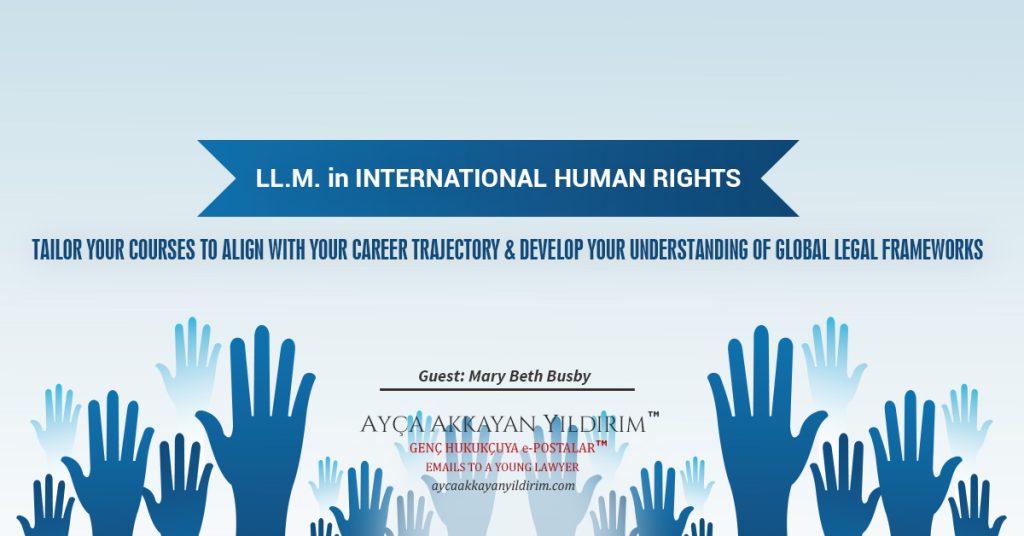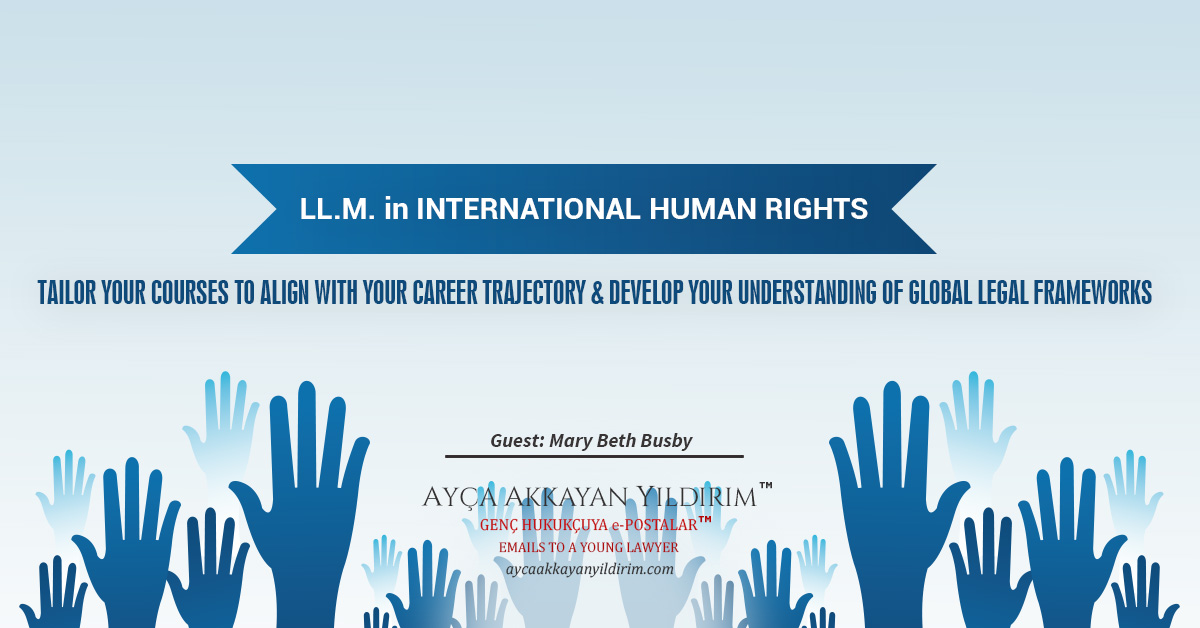Tuesday, December 13, 2022


Date : December 13, 2022
To : Young Lawyers
Re : LL.M. in INTERNATIONAL HUMAN RIGHTS: TAILOR YOUR COURSES TO ALIGN WITH YOUR CAREER TRAJECTORY & DEVELOP YOUR UNDERSTANDING OF GLOBAL LEGAL FRAMEWORKS
INTERNATIONAL LL.M. PROGRAMS: NORTHWESTERN UNIVERSITY PRITZKER SCHOOL OF LAW, CHICAGO, IL, USA
I sincerely thank Mary Beth Busby, Director of Graduate and International Program Admissions, for taking the time to answer my questions. GHK
GHK: Director Busby, based on your experience, could you explain the top reasons for a student to pursue an LL.M. in International Human Rights? How does the Northwestern Pritzker School of Law help students achieve their goals?
MBB: Northwestern is one of the few schools with a specialized program in International Human Rights. Our program is ideal for students who are fully committed to studying and practicing in the area of International Human Rights. Our program is very small, so students have the opportunity to develop strong relationships with the faculty, all of whom are very connected within the larger International Human Rights community. We also offer the option to do a directed research project, which allows students to focus their studies on a specific area of International Human Rights.
GHK: I understand that students accepted to the LL.M. in the International Human Rights program can also benefit from Northwestern’s Center for International Human Rights. Could you give us information about the possible benefits the students can utilize?
MBB: The Center for International Human Rights gives students the opportunity to work on real cases with real clients. This provides students with an excellent opportunity to gain hands-on experience and develop essential advocacy skills – both written and oral. Students in the program routinely travel to other countries as part of their work. Recent projects include combatting corporate impunity for atrocity crimes in Central Africa, advocating for children deprived of liberty in Malawi, and supporting indigenous people’s opposition to the Lega Dembi gold mine in Ethiopia, among others.
GHK: Does Northwestern Pritzker School of Law have an approximate hierarchy of what is most valuable for admissions: GPA, language score, personal statement, and letters of recommendation? Should an applicant include an addendum to explain his or her low GPA or language score?
MBB: No, we take a very holistic approach. Of course, academic performance and English language proficiency are important, but we also consider the letters of recommendation, work experience, personal statement, and a candidate’s commitment to international human rights. We allow strengths and weaknesses to balance one another. For example, if an applicant had average grades but developed a strong resume in international human rights after graduation and submitted strong letters of recommendation, that applicant would be competitive for admission. If there is an explanation or reason for a perceived weakness or shortcoming, such as academic performance, I strongly advise candidates to submit an addendum to help put things into context.
GHK: The number of courses can initially be quite overwhelming for students who sit down to create the right curricula for themselves. Northwestern Pritzker School of Law allows each student to meet with Professor Bridget Arimond to design his/her schedule. Could you tell us a bit more about this personalized process?
MBB: Professor Arimond is the faculty director of the program. She meets with incoming students virtually during the summer before the program begins to discuss their academic and career goals in order to help them select the courses that will be most beneficial. Once the students arrive on campus, Professor Arimond provides continued academic guidance and support throughout the program.
GHK: A signature feature of the LL.M. in International Human Rights Program is its small class size. Could you please tell us about the benefits of small class sizes? Does this feature improve academic outcomes?
MBB: Because of the specialized nature of the curriculum, the program does not have the broad appeal of our general LL.M. Program, where students can select courses from more than 300 electives each year. The IHR Program is designed to be narrow in focus and thus will appeal to a smaller group of applicants. The benefits of the small class size are many. First, as discussed above, students in the IHR program enjoy unparalleled access to faculty, who provide guidance and advice. Additionally, there is never an issue of being able to take the courses that best fit a student’s academic and career goals.
GHK: Since LL.M. degrees are typically expensive, could you please tell us about the merit or need-based scholarships that Northwestern Pritzker School of Law offers? What characteristics does Northwestern Pritzker School of Law look for in a candidate for merit or need-based scholarship?
MBB: We have a formal scholarship application process that takes place after admissions decisions have been made. We award scholarships based on both merit and need. For the former, we look at the same criteria that use for admission: academic performance, work experience, language skills, and commitment to international human rights. Regarding need, the scholarship application provides the information we need about financial resources, sponsorship, and private or governmental scholarships that help us make this assessment. We have one scholarship – the Evans Scholarship – that covers both tuition and the majority of living expenses. As you might imagine, this scholarship is highly competitive and is awarded to our most outstanding candidate of the admissions cycle. Our other scholarships range in size and cover only a portion of tuition (typically between 25 and 75%).
GHK: Does the LL.M. in International Human Rights at Northwestern Pritzker School of Law offer exposure to practical work with human rights and humanitarian actors?
MBB: Yes, through many sources. First, most of our students practiced in the field of International Human Rights prior to joining the program. One of our most unique curricular offerings is the International Human Rights Colloquium course. Each week a student is responsible for giving a presentation. Topics range from the human rights situation in the student’s country to an overview of the work that he or she did prior to entering the program. Another way that students engage with human rights practitioners is through the Center for International Human Rights. Our students routinely travel to the U.N. Commission on Human Rights, and the International Criminal Courts (ICC) as part of their work. Students may travel to countries to do fieldwork for a project. Our current students have traveled to the countries of Georgia and Malawi this year.
GHK: What are the career prospects for graduates of an LL.M. in human rights program? In other words, what career opportunities exist upon completion of the program, and what is the level of employment of past students?
MBB: IHR LL.M. graduates go on to a variety of job opportunities – some return to the jobs they previously held, and others pursue new opportunities. For those who wish to gain experience working at an NGO or other organization in the US before returning to their home countries or other destinations, the Optional Practical Training (OPT) program will give them that possibility. Some examples of where our LL.M. IHR graduates work include: The U.N. Commission on International Human Rights, Amnesty International, and Antheum Global. Other alumni have gone on to teach at universities across the globe.
GHK: Thank you for taking the time to speak with us, Director Busby. In closing, is there any general advice you could share with our readers regarding the LL.M. in International Human Rights application process?
MBB: Because we admit and award scholarships on a rolling basis, it is advisable to apply on or before the January application deadline. In addition to academic performance, work experience, and language skills, we pay very close attention to a candidate’s commitment to International Human Rights, as demonstrated through work experience, pro bono work, community service activities, and participation in IHR-related activities, and professional organizations.
